
RoadEfficiency: an efficient vehicle fleet is key to success at Gerdes + Landwehr
Business & Logistics
Cement is a gigantic business – and a challenge for every transport operator. Gerdes + Landwehr plays in the premier league when it comes to the logistics associated with this building material, not least with their SiloNet Logistik joint venture, where everything is geared towards RoadEfficiency.
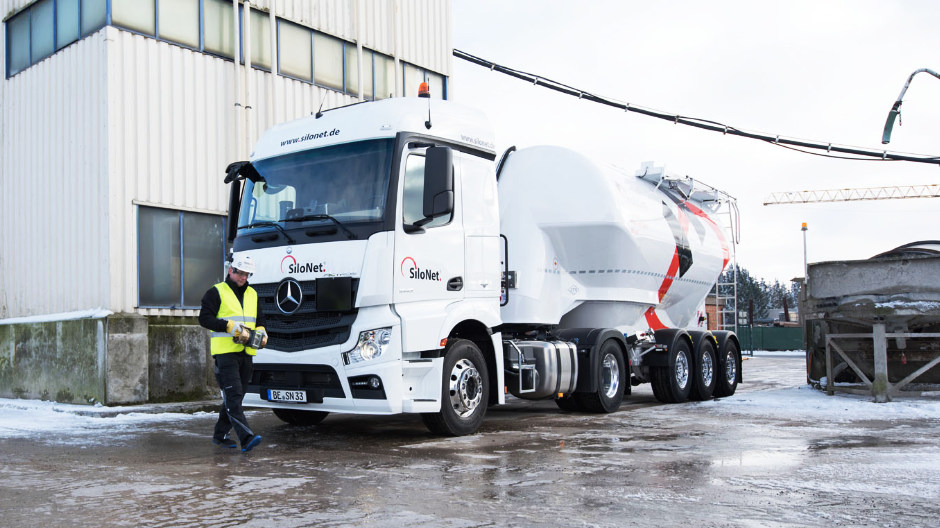

No matter what brand of vehicle is involved, transporting cement is a demanding job. This is particularly true if it is destined for production of ready-mix concrete – which is what more than half of the volume of cement consumed in Germany is used for. “This is such a volatile business that even some of the big players have quit the market,” says John Henrik Landwehr. “This is because concrete plants only start up production whenever there is demand from construction sites – and that can fluctuate quite considerably.”
A key factor in these fluctuations is the weather. Most types of ready-mixed concrete, for example, cannot be produced or used at sub-zero temperatures, partly because the water that needs to be added will freeze. But even in stable and fair weather conditions, the quantities required can vary greatly, due to fluctuating levels of construction activity in general. Sometimes it can change between the extremes of “no demand” and “very high demand” in just a few hours. “Orders from the construction sites arrive here until the early afternoon – and the first deliveries are then due at 5 a.m. the next morning,” says the general manager.
Concrete must be delivered right on time.
When it comes to ready-mix concrete, punctuality has top priority – and this automatically goes for the cement supplier as well. “Construction of a motorway bridge, for example, usually involves the use of so-called sliding shuttering,” says Landwehr. This means that there needs to be a constant supply of a predetermined quantity of ready-mixed concrete flowing steadily into the formwork. If a hold-up in the supply of ready-mix concrete forces the workers to interrupt the process, allowing the concrete already poured to harden beyond a certain point, then the stability of the structure could be impaired. “Concrete must arrive right on time,” says Landwehr, who joined the company’s management at the age of 24. “Not to put too fine a point on it: just-in-time delivery, something that is demanded by many manufacturing enterprises, is child’s play by comparison.”
Even when deliveries run smoothly, the transport operator is not out of the woods yet: “The cement must not be contaminated under any circumstances because this would affect the quality,” says Landwehr. As the silo trailers do not get cleaned once they are en route, the driver must stick to the prescribed sequence when loading the products. “This is why it is extremely important for us to have good personnel – the drivers must be highly responsible,” says the general manager: “There is a lot that could go wrong – but with us that simply doesn’t happen!”
“Just-in-time delivery, something that is demanded by many manufacturing enterprises, is child’s play compared to the transportation of ready-mix concrete.”
– John Henrik Landwehr
And business is indeed booming. “We achieve margins of between five and seven per cent, whereas in Germany generally they are only rarely above three per cent,” says Landwehr. Key success factors are the silo trailers, which weigh 800 kilograms less than conventional models. “We cooperated in the development of these trailers. They allow an increase in payload of three per cent.” The dispatchers also contribute towards a high degree of truck capacity utilisation through a sophisticated system of trilateral and quadrilateral transport routes. The trucks themselves and their on-board equipment take care of the rest. Case in point: Landwehr arranged for the already fuel-efficient Actros to be fitted with the Predictive Powertrain Control as standard – to cut consumption even more.
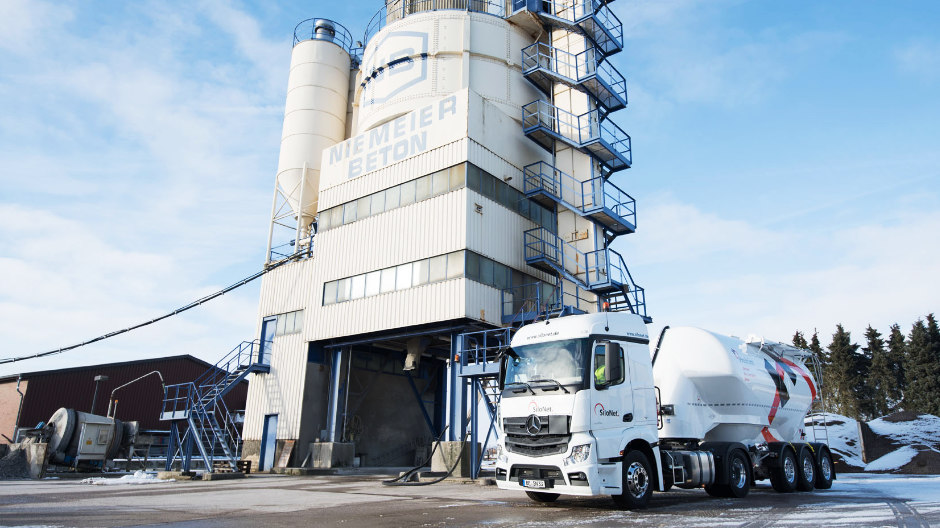
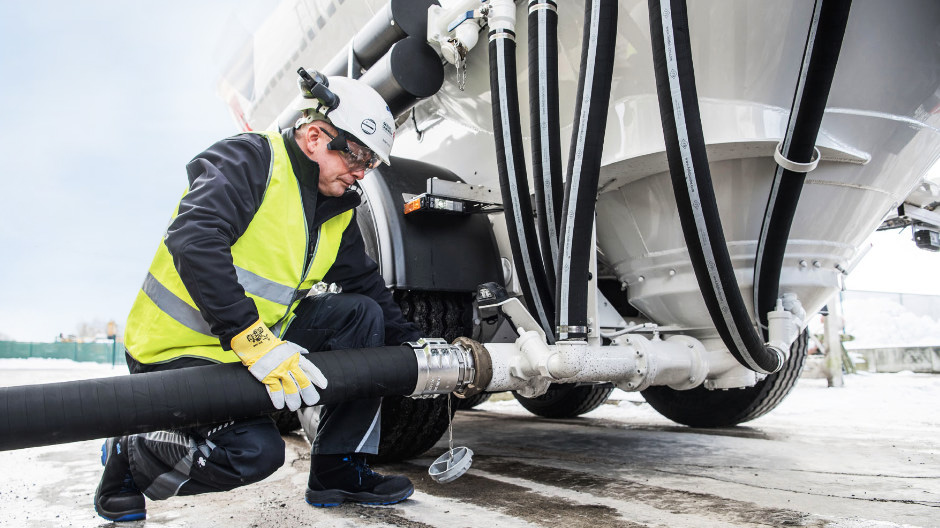
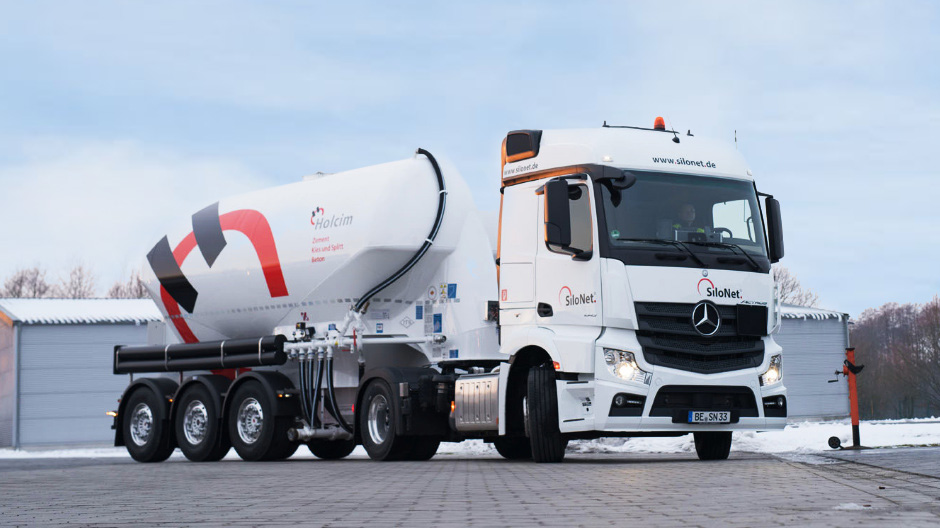
Rising volumes projected.
Landwehr’s forecast for the coming years: “We expect transport volumes to rise significantly. In Germany, housing construction, non-residential construction and civil engineering each account for about one third of the volume – and all three areas are performing well!” Right now there is actually a certain bottleneck in terms of the available loading capacity. “The manufacturers are simply unable to produce enough new silo trailers to meet current demand.”
There is, however, no shortage of qualified and motivated drivers at Gerdes + Landwehr. “We’re getting more applications now than ever before. The main reason for that is, of course, that we are a nice company to work for,” says Landwehr, smiling wryly. But the general conditions for drivers doing cement runs are attractive as well: they can usually spend their evenings at home. Moreover, while the trips themselves are demanding, the drivers can load their silo trailers independently, and even when unloading they do not have to follow orders from anyone else. Quite different from deliveries to loading bays. SiloNet driver Herbert Schulz is one who appreciates this level of freedom, he says. “But now I do need to get going!” And he’s off, back to the cement plant, to load the next 29 tonnes!
Low total cost.
In terms of overall economy, the general manager John Henrik Landwehr gives the Actros trucks at Gerdes + Landwehr a “very good” rating. Achieving low costs from the outset and over the entire service life, with a focus on reduced consumption is the first pillar of RoadEfficiency.
Reduced consumption is made possible by the introduction of innovative, fuel-saving technology, implemented by Mercedes-Benz Trucks in particular in the form of the second generation of the Euro VI in-line six-cylinder engines OM 470, OM 471 and OM 473. In addition, auxiliary equipment and the aerodynamics of the trucks have been optimised. Also, the anticipative Predictive Powertrain Control can achieve an additional diesel saving of up to five percent – an assistance system that Landwehr considers “indispensable” if they are to have their entire fleet use an economical driving style. In addition, low repair and maintenance costs, high residual values as well as attractive leasing and financing conditions also contribute to the efficiency and low overall costs of the vehicles.
High level of safety.
Safety enjoys top priority at Gerdes + Landwehr. The Group’s white SiloNet trucks were the first batch of vehicles delivered to customers anywhere in the world with Active Brake Assist 4 and Sideguard Assist* systems on board. The Mercedes-Benz trucks in the Gerdes + Landwehr livery are also equipped with the latest assist and safety systems. The fundamental goals: to actively relieve the drivers, to protect the environment, to protect the vehicle and its cargo, and thus to contribute towards achieving greater efficiency. This is the second pillar in the RoadEfficiency concept: safe trucks represent a step forward for all road users, and they are also more efficient because they are less likely to suffer downtime as a result of accidents.
Mercedes-Benz Trucks has been developing innovative safety systems for over 45 years now. Mercedes-Benz Trucks continues this pioneering effort with the enhanced versions of the Active Brake Assist 4 and the new Sideguard Assist – introducing two safety systems into road transportation that provide drivers with additional support in situations where there is a danger of injuring pedestrians. But that is not all: ABS and ASR, the electronic braking system, the Lane Keeping Assist system, the Stability Control Assist system, and the Attention Assist system – they all contribute towards a greater level of safety.
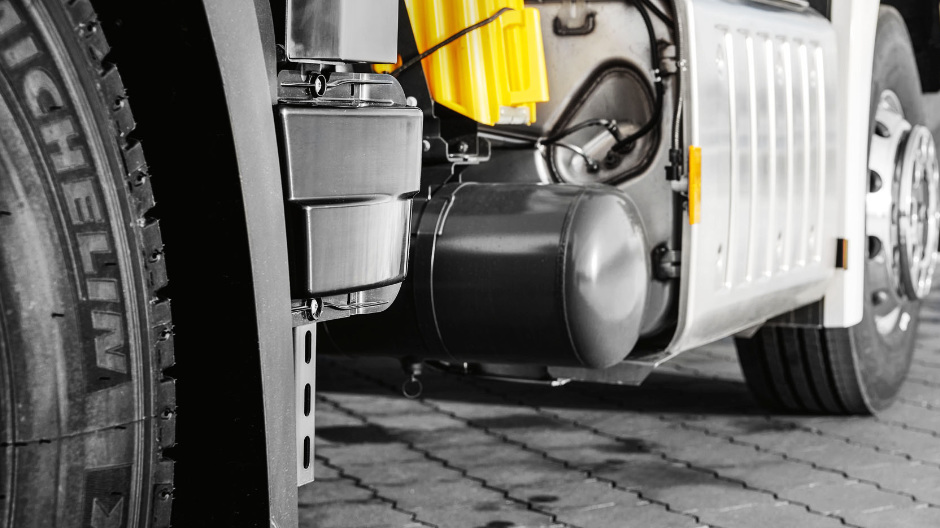
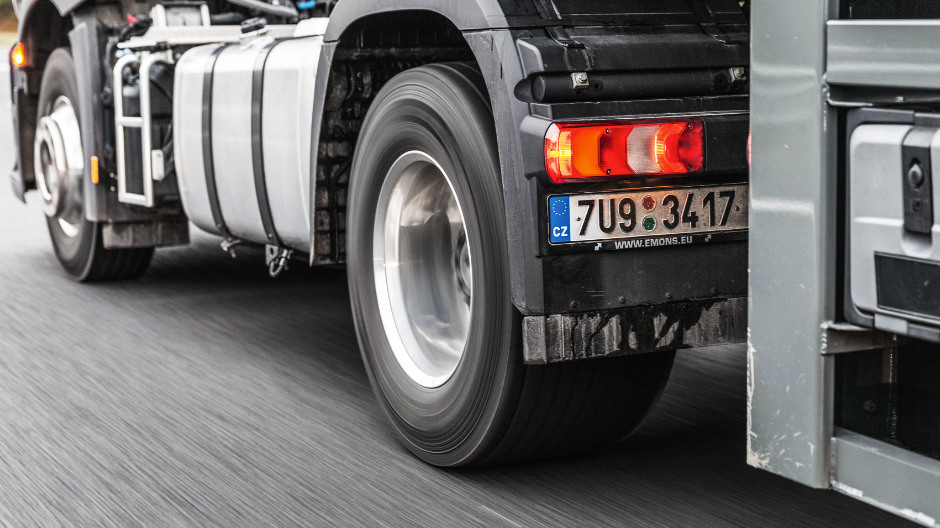
High vehicle utilisation.
For the kind of cement transports Gerdes + Landwehr and the subsidiary SiloNet Logistik carry out every day, adherence to schedules is an absolute must. This can only happen if the trucks can be deployed reliably at all times. And that – high vehicle utilisation – is the third pillar in RoadEfficiency.
Anyone operating with trucks made by Mercedes-Benz will benefit from the fact that non-scheduled downtimes are an absolute rarity, and that time at the workshops can be planned to fit in with delivery schedules. This is accomplished by means of the new Mercedes-Benz Uptime service, which is currently being tested with 18 of the Gerdes + Landwehr trucks. Thanks to this service, fleet managers can monitor the technical condition of their trucks at all times and can take action so as to avoid having to call in the breakdown service. The need for urgent repairs is detected without delay, repairs are facilitated thanks to the availability of information in real time, allowing repairs and maintenance to be precisely scheduled. In addition to the intelligent networking of vehicle, dispatch and workshop through Mercedes-Benz Uptime, the transport management using Fleetboard also boosts the hours of operation of the trucks, thanks to the efficient communication between the drivers and the dispatch team.
Photos: Christian Schmid




Comment
Please log in to post a comment.
No comments yet